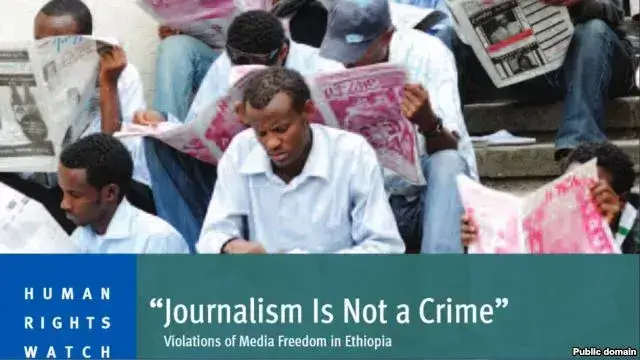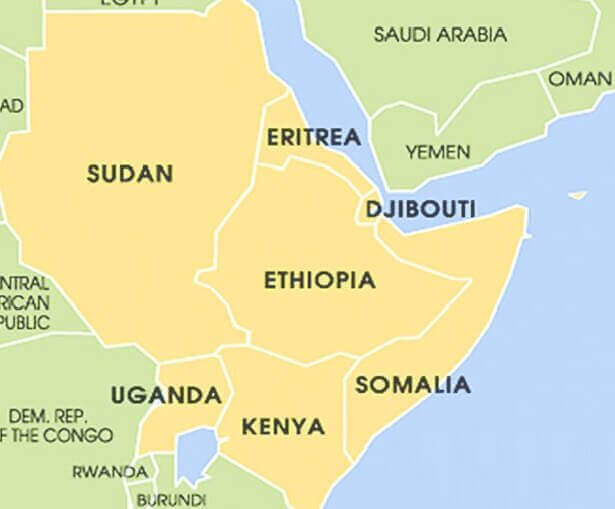Amid the murder of Girma Yeshitla, Ethiopian Prime Minister Abiy Ahmed lacks transparency, and that’s why people don’t trust him.
High Profile Murder in Amhara
Last week in Ethiopia, the leader of the Amhara region Prosperity Party Girma Yeshitla was assassinated along with members of his family and security detail. The murder is significant in that it is a high ranking ruling party official killed at a time of heightened tensions between ethnically divided regional forces. At this time, heavy accusations are being thrown around, but one cannot say conclusively who did it. Prime Minister Abiy Ahmed hastily released a statement a matter of hours after the murders were announced, inferring that he already knew the culprits:

Those who couldn’t win ideas with ideas have taken away the soul of our brother Girma Yeshitla. In a century where resolving differences in a civilized way has become a culture, trying to convince those who are different in ideas with guns is the ultimate extremism.
The shameful and horrible act committed by violent extremists who believe they shouldn’t have thought different from us in the area where he was born and raised. It shows that if we don’t fight and get rid of extremism early, it will lead us to our extinction.
May your soul rest in peace.
Although Girma was an Amhara, he was a part of the ruling Prosperity Party and had a close relationship with Prime Minister Abiy. He was in support of the controversial decision to disarm the regional forces in favor of a centralized army, which the federal government is calling “military reorganization.” To many of the Amhara people — a population spanning 30 million — this policy is a power grab by the Ethiopian government. This would effectively dismantle the Amhara regional forces and militia, leaving them defenseless to outside threats, including those from the national government. For this, and his loyalty to the ruling party, Girma was seen as a traitor to his ethnicity and hated by many Amharas.
Girma’s death leaves more questions than answers. Girma was traveling from Mehal Meda to his hometown Debre Birhan in the north Showa zone at a place called Menz Guwasa at the time of the attack. No photos of the crime scene were released. It is reported he had six guards with him. It is not clear if they were shot while traveling in their vehicle or were detained beforehand. A reliable source tells me there are some reports that claim he was not in his original car, so whoever was the killer had to know details about where he was going.
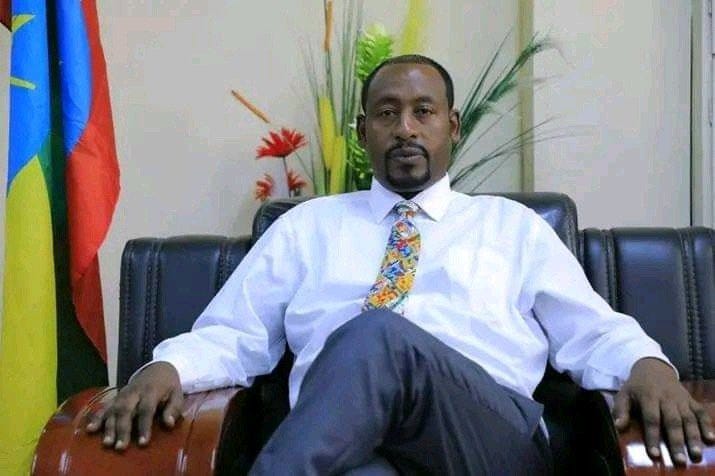
Ethio360, the organization that first broke news of the murders, reported that eyewitnesses confirmed that the federal government and Prosperity Party were involved in the assassination of Girma. What would be the motive for this? Many have claimed that these high-profile murders will be used as an excuse to crack down on journalists and protestors in the Amhara region. The Amhara regional state government, which does not represent the views of many Amharas, said in a statement in response to the killing that they are going to act “to prevent the anarchy and terrorist acts that these extremist forces are carrying out in the region.” The regional state government will take action to control and enforce the law, which includes disarming the Amhara regional defense forces and associated militias and jailing those who present opposition with little care for due process.
On the other hand, the GoE and Amhara regional state government has blamed the killings on the ‘Fano’ Amhara militia group. They have claimed that the group is working to “incite discord between the defense forces and the people by disseminating false information that blackmails the army”. The GoE has cited a phone conversation between Amhara Fanos members conspiring to kill Girma as evidence that Fano was behind the murders. Protests against Fano have broken out in the South Wello region, and Girma’s family is also accusing Fano of the assassination. But according to an investigation by Digi forensic experts, the phone call was proved to be not authentic.
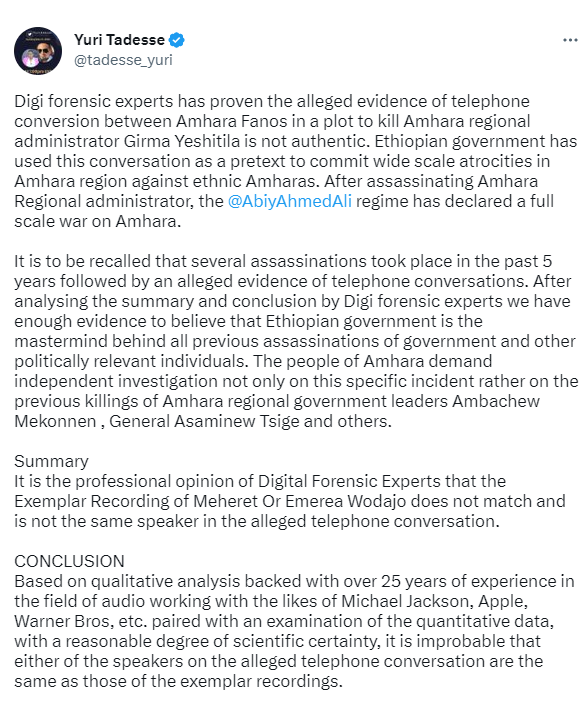
The federal government’s approach seems to be to detain people first, make judgements of innocence or guilt later, if at all. Even though it stands to reason that no such investigation could be thoroughly completed in the time between the murders and Abiy’s statement. In relation to the murders, the Ethiopian Joint Security and Intelligence Task Force have arrested 47 people, claiming that they were involved in a plot to overthrow the federal government by assassinating senior Amhara officials. Among those arrested are journalists who have been accused of terrorism offenses. The task force has also accused 11 media personalities from Ethio360 and other prominent media based in the US of being responsible for the attack. The government is currently working to extradite these officials to Ethiopia to face punishment.
Abiy later doubled down on his initial statement at an inauguration ceremony on May 1st, saying the killing was done by groups who could not tolerate peaceful discourse and different ideals. This time, he mentioned ‘unnamed’ external forces that have been meddling in Ethiopia’s internal affairs:
“On this occasion, I would like to warn these forces, especially non-Ethiopian forces, to not meddle in our internal affairs; they cannot benefit by trying to create division among our people every time there is a sign of [instability]. I warn that they should to leave our affairs to ourselves and focus on many things they need to do but have not done for themselves in their own land”
Of course, Abiy has no problem with soliciting help from outside forces if they serve his interests, when he conveniently ignored the presence of Eritrean troops in northern Ethiopia for the first 6 months of the Tigray war. These forces were instrumental in defeating the Tigray People’s Liberation Front (TPLF) and winning the war for Abiy. However, during this time, human rights groups reported on Eritrean soldiers committing atrocities, including killing unarmed civilians, raping women, and engaging in widespread looting. Abiy was aware of how difficult it would be to convince Ethiopians that bringing Eritrean troops into their country was a good idea, so he kept it a hidden, a common theme in the way Abiy governs.
The Fog of Authoritarianism
Blaming members of the media and arresting journalists is a bad look for the GoE, especially with the massive lack of trust many regional forces have for the federal government, but it is nothing new. The Committee to Protect Journalists has called Ethiopia one of the leading jailors of journalists on the continent. When Abiy Ahmed took power in 2018, he unbanned several social media outlets and released thousands of political prisoners. But the situation quickly got worse during the Tigray war of 2020-2022, with journalists routinely being detained and threatened, sometimes for just being in the area with a camera.
When journalists are detained, they are sometimes held for weeks without formal charges. Whenever media outlets like Al Jazeera and Reuters reach out to the Prime Ministers office on the matter of journalism censorship, the office declines requests for comment. Whether it was framing the conflict as an internal law issue or covering up war crimes committed by the GoE, he quickly found it advantageous to limit media visibility and transparency of government.
Internet access and social media platforms are frequently restricted at times of unrest and crisis. In February, when protests broke out in the Oromiya region after local church officials declared themselves archbishops and set up their own governing body, the national government restricted access to Facebook, Tiktok, and Telegram. As well as social media apps, the government has used communication black-out tactics restricting internet, mobile phones and landlines, which in the past has made it more difficult for aid agencies to navigate unfolding humanitarian crisis in Ethiopia.

The GoE justifies the arrest of journalists and the censorship of media to combat disinformation and seditious activities, but this has made it impossible in many circumstances to discern fact from fiction. Journalists don’t want to venture into life-threatening zones or walk on eggshells to avoid being detained for filming at the wrong time. This media blackout leads to a lack of investigations on massacres, widespread looting and rape, including those from outside forces like Eritrean soldiers during the Tigray war, or the threats from the current war happening in neighboring Sudan. If Abiy really wanted to protect Ethiopia from “outside forces” he would facilitate an environment that protects freedom of the press to bring more international coverage of the humanitarian and security concerns that Ethiopians face.
Silence over crisis in Amhara
Starting in early April, federal forces moved into Amhara to begin their process of “military reorganization”. In response, massive protests broke out in many areas across the region, including Gondar, Kobe, Sekota, Woldia. When federal forces broke into these areas, violence ensued and mass arrests were made. The GoE imposed a curfew on several towns and cities, which temporarily worked in certain areas. But many of the local forces moved to more remote areas, while others joined in open fighting against the federal forces. Blockades were erected by residents to stop the progress of the national army.
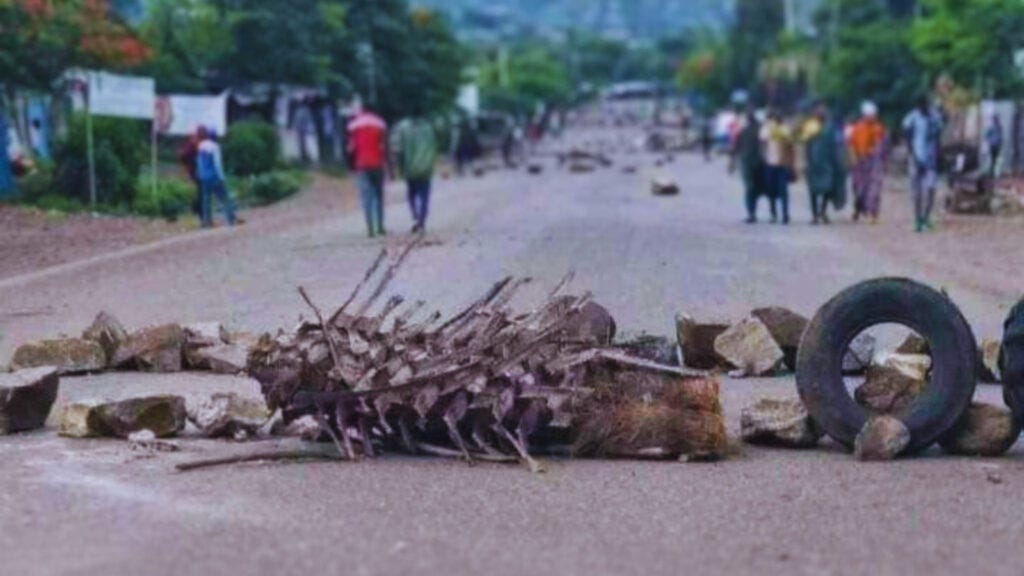
Resistance to the military reorganization is justified for the Amhara. Since Abiy took power, multiple systematic massacres of them have taken place, many of them in the Oromia region. It was only six months ago that Amhara regional forces aided federal forces in their fight against the Tigray. Before that, the Amhara found themselves in a border dispute with Sudan over the Al Fashaga territory to the west. But perhaps biggest threat comes from their own federal government. Deep ethnic resentment have long existed between different Ethiopian groups, and only in times of strong central rulers or common enemies have they been able to unite. Many Oromo and Tigray have long standing gripes with the Amhara and can take advantage of a defenseless region.
As I have stated before, military unification is a sound idea in the long run, but Ethiopia’s wounds are far too fresh for such a radical shift. To quote my last piece on the matter:
What the government ought to be conveying is an adherence to the foundational principles of the Ethiopian constitution: respecting the self determination of different ethnicities and protecting their right to self-security. Restructuring the identity of the Ethiopian people to once again embrace an Ethiopian identity, even within the context of your own ethnic background — even if that means criticizing your own ethnic political structure that bolstered you into power. Now is not the time for forced military consolidation, as it will not bring about the multinational unity that Abiy allegedly hopes to achieve. The reason Ethiopia has been resilient to outside parties is its ability to put aside ethnic differences and unite as a greater nation, but this must be done willingly, at opportune times, with more concessions, discourse, and respect for ethnic differences.
Ethiopia Needs a Free Media
Abiy Ahmed claims that his ultimate goal is a united Ethiopia, the suppression of media, jailing of journalists, and overall lack of transparency has led Ethiopians to become as divided as ever. While there are some conflicts that censorship can mitigate in the short-term, it does not benefit stability in Ethiopia to govern in such a manner. These tactics only erode trust in his leadership and negatively impacts unity of the country. The clear downsides that these tactics produce would only be offset if they had things equally as detrimental to hide. So blame for the lack of clarity on crucial components of ethnic conflicts must lay on him.
Recently, multiple ethnic groups have been accusing each other of genocide(see #Tigraygenocide, #Amharagenocide) at what was supposed to be a time of peace, following two years of bloody conflict with Tigray. The scale and scope of internal struggles hardly ever reach the international community, and there’s a warped idea that Ethiopia is experiencing peace and stability while nearly falling apart at the seems. For example, while the national military is making moves in major cities in Amhara, breaking out in violence, US Secretary of State Anthony Blinken recently made a statement commending the federal government for their continued efforts towards peace.
If Abiy and the ruling Prosperity Party were innocent of crimes, they should welcome more independent investigations, including one into the death of Girma Yeshitla, instead of making hasty and vague claims that they know who the culprits are. They need to be more forthcoming with the public, even when it doesn’t benefit their immediate short terms goals, because it is the key to establishing trust with the people. They need to welcome international human rights organizations, with promises of security, to act as watchdogs to hold regional and national powers to account. The national government has a proven record of not being able to be trusted, and inviting more third party mediators into the process would be a good start.
While there doesn’t seem to be any immediate threats big enough to challenge their rule, so long as they maintain a Ministry of Truth-style media, the lack of trust that multiple regional powers have for the federal regime may never be restored. Abiy Ahmed originally campaigned as a peacemaker, promoting dialogue over violence, yet leads one the least transparent, pro-censorship regimes in Africa. Blaming Girma’s murder on “those who couldn’t win ideas with ideas”, yet his censorship regime proves he cannot do that very thing. Ethiopia is again falling into the age old trope of a governing body limiting free press and falling into authoritarianism to hold onto power. Yet, if they strive to be a Democracy, the GoE must embrace the principles of free press; for if you trust them to elect capable leaders that will make decisions for the country, you have to trust them to have an open and honest media.
While there don’t seem to be any immediate threats big enough to challenge their rule, so long as they maintain a Ministry of Truth-style media, the lack of trust that multiple regional powers have for the federal regime may never be restored. Abiy Ahmed campaigns as a peacemaker, promoting dialogue over violence, yet he leads one of the least transparent and most censorial regimes in Africa. He blames Girma’s murder on “those who couldn’t win ideas with ideas” is highly ironic, given that he relies on censorship to rule. Ethiopia is again falling into the age-old trope of a governing body limiting free press and falling into authoritarianism to hold onto power. Yet, if they strive to be a democracy, the Government of Ethiopia must embrace the principles of free press — for if you trust people to elect capable leaders that will make decisions for the country, you have to trust their ability to handle an open and honest media.
Anything less is an admission of your own guilt.


